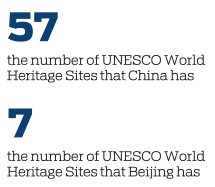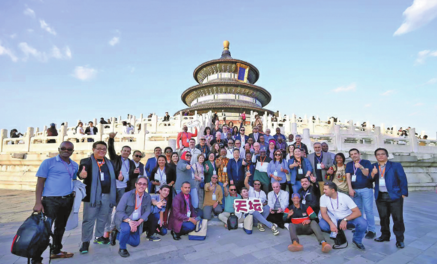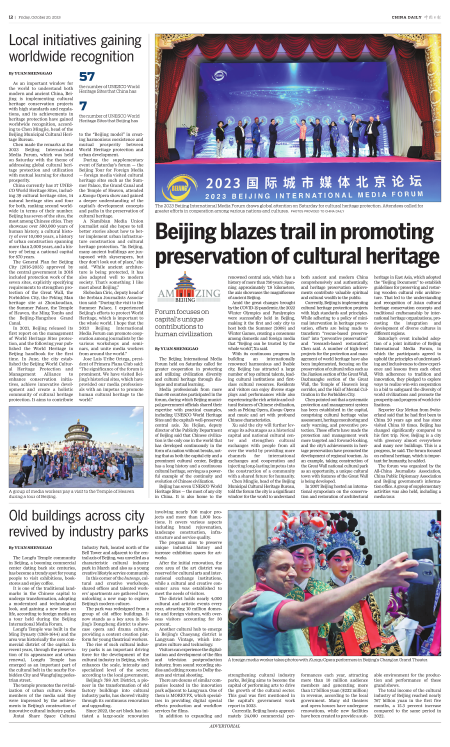

A group of media workers pay a visit to the Temple of Heaven during a tour of Beijing.
As an important window for the world to understand both modern and ancient China, Beijing is implementing cultural heritage conservation projects with high standards and regulations, and its achievements in heritage protection have gained worldwide recognition, according to Chen Mingjie, head of the Beijing Municipal Cultural Heritage Bureau.
Chen made the remarks at the 2023 Beijing International Media Forum, which was held on Saturday with the theme of addressing global cultural heritage protection and utilization with mutual learning for shared prosperity.
China currently has 57 UNESCO World Heritage Sites, including 39 cultural heritage sites, 14 natural heritage sites and four for both, ranking second worldwide in terms of their number. Beijing has seven of the sites, the most among Chinese cities. They showcase over 500,000 years of human history, a cultural history of over 10,000 years, a history of urban construction spanning more than 3,000 years, and a history of being a national capital for 870 years.
The General Plan for Beijing City (2016-2035) approved by the central government in 2016 included protection work of the seven sites, explicitly specifying requirements to strengthen protection of the Great Wall, the Forbidden City, the Peking Man heritage site at Zhoukoudian, the Summer Palace, the Temple of Heaven, the Ming Tombs and the Beijing-Hangzhou Grand Canal.
In 2021, Beijing released its first report on the management of World Heritage Sites protection, and the following year published the World Heritage in Beijing handbook for the first time. In June, the city established the Beijing World Cultural Heritage Protection and Management Alliance to enhance conservation initiatives, achieve innovative development and create a holistic community of cultural heritage protection. It aims to contribute to the "Beijing model" in creating harmonious coexistence and mutual prosperity between World Heritage protection and urban development.
During the supplementary event of Saturday's forum — the Beijing Tour for Foreign Media — foreign media visited cultural heritage sites such as the Summer Palace, the Grand Canal and the Temple of Heaven, attended a Kunqu Opera show and gained a deeper understanding of the capital's development concepts and paths in the preservation of cultural heritage.
A Namibian Media Union journalist said she hopes to tell better stories about how to better implement urban infrastructure construction and cultural heritage protection. "In Beijing, many ancient buildings are juxtaposed with skyscrapers, but they don't look out of place," she said. "While ancient architecture is being protected, it has also adapted well to modern society. That's something I like most about Beijing."
Slobodan Ciric, deputy head of the Serbian Journalists Association said: "During the visit to the Summer Palace, I experienced Beijing's efforts to protect World Heritage, which is important to the whole world. I hope that the 2023 Beijing International Media Forum can promote cooperation among journalists by the various workshops and seminars, and unite media workers from around the world."
Jose Luis Uribe Ortega, president of Primera Plana Club said: "The significance of the forum is prominent. We have visited Beijing's historical sites, which have provided our media professionals with an impetus to promote human cultural heritage to the world."

